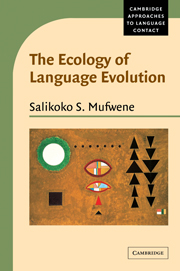Book contents
- Frontmatter
- Contents
- List of illustrations
- Preface
- Acknowledgments
- 1 Introduction
- 2 The Founder Principle in the development of creoles
- 3 The development of American Englishes: factoring contact in and the social bias out
- 4 The legitimate and illegitimate offspring of English
- 5 What research on the development of creoles can contribute to genetic linguistics
- 6 Language contact, evolution, and death: how ecology rolls the dice
- 7 Past and recent population movements in Africa: their impact on its linguistic landscape
- 8 Conclusions: the big picture
- Notes
- References
- Author index
- Subject index
4 - The legitimate and illegitimate offspring of English
Published online by Cambridge University Press: 18 December 2009
- Frontmatter
- Contents
- List of illustrations
- Preface
- Acknowledgments
- 1 Introduction
- 2 The Founder Principle in the development of creoles
- 3 The development of American Englishes: factoring contact in and the social bias out
- 4 The legitimate and illegitimate offspring of English
- 5 What research on the development of creoles can contribute to genetic linguistics
- 6 Language contact, evolution, and death: how ecology rolls the dice
- 7 Past and recent population movements in Africa: their impact on its linguistic landscape
- 8 Conclusions: the big picture
- Notes
- References
- Author index
- Subject index
Summary
In this chapter I extend the discussion of chapter 3 to the broader context of Englishes around the world. I start with the question of what criteria have been used to name and assign them to different categories. I show that there is a social bias behind the labels used to distinguish “new Englishes” from each other. The term new English applies technically to all those varieties that have resulted from the English colonial expansion, although British English today is as new as the other varieties. I also argue that mutual intelligibility between speakers of different varieties is not a reliable criterion for determining whether or not they are separate languages. This especially regards the way English pidgins and creoles have been disfranchised from the group of Englishes, except when it is necessary to determine what proportion of the world's population is anglophone. The question of social bias is discussed mostly regarding the distinction “native” vs. “non-native Englishes,” with the adjectives native and non-native used as modifiers of language varieties rather than of the competences of speakers. I show that language contact has been a relevant ecological factor in the evolution of English since its inception.
Much of the debate about the above distinction between Englishes is indirectly related to norm-setting. Chaudenson (1992) argues convincingly that much about the identification of creoles as separate languages has to do with their autonomization, i.e., the ability of their speakers to develop norms that are community-based rather than imposed by speakers of other varieties of the lexifier.
- Type
- Chapter
- Information
- The Ecology of Language Evolution , pp. 106 - 125Publisher: Cambridge University PressPrint publication year: 2001



